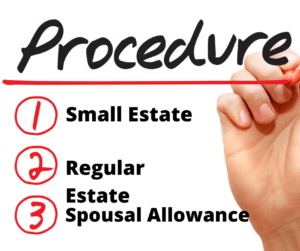Understanding the Probate Process With or Without a Will

Most people have heard of the probate process, which takes place in probate court. And, they know that it is something that happens after someone passes away. Unfortunately, fewer people know that it can be a long and complicated process. It can sometimes take months, or even years, to complete. So, understanding the probate process is important.
The probate process can be necessary whether or not a person dies with a Last Will and Testament (will). If someone dies and their will names a person to serve as the executor of their estate, then a probate court will appoint that person.
But what if the will does not name an executor? Well, then then a probate court will appoint an executor.
And what if there is no will? Again, the probate court appoints an administrator.
Executor Duties

First, the executor files a petition with the probate court to be appointed Executor. Then, any heirs or beneficiaries who are connected to the will are notified. Those persons have the opportunity to contest the will. The executor has control of the estate. The Estate is comprised of all that the deceased person has left behind that is not already designated to go to beneficiaries.
Your executor then pays any debts and taxes owed by the you, the deceased person. Afterwards, the executor distributes the remaining assets according to the wishes expressed in the will. If there is no will, the probate court will distribute the assets in accordance with state laws. This is called intestate.
Different Probate Procedures

Since the court system is backed up, probate cases can take a long time to settle. This can be a problem for families who are trying to resolve a loved one’s estate and move on with their lives. It can be especially challenging for families in need who could really benefit from receiving their loved one’s assets sooner rather than later. Each state has different probate laws, such as North Carolina, offering a simplified probate process for smaller estates. So before beginning the probate process, find out if you are able to take advantage of the more straightforward process.
Small Estates
For instance, in North Carolina, you may might open a small estate which is a quicker process. To open a small estate, the decedent must not own more than twenty thousand dollars ($20,000) in assets. You also have to wait thirty (30) days after someone passes to file.
If you meet the above requirements, you can open a small estate. Unlike a full blown estate, you complete a small estate within ninety (90) days. You initially file an Application for Collection of Decedent’s Personal Property. You list all assets Decedent owned at the time of his or her death. Additionally, you list the value of that property. After ninety (90) days, you file an Affidavit of Distribution. The estate is then closed.
Regular Probate
Most people file a regular probate estate administration case. You first apply to be appointed the Executor or Administrator. The Court issues you Letters of Authority. These Letters allow you to act on behalf of the decedent.
You will then file a Notice to Creditors in a local newspaper. Ninety (90) days after opening the Estate, you file an Inventory. The Inventory lists all the property and values of Decedent’s property at the time of death.
When the creditor claim deadline has passed, and no claims have been filed, you file a. Final Account. The estate is then closed.
Spousal Allowance
In North Carolina, a spouse is entitled to the first Sixty Thousand Dollars ($60,000) of a spouse’s estate. To receive this allowance, you file a Spousal Allowance.
Probate Mistakes

Completing the probate process take time. Further, is a complex process with many ways to make mistakes. For example, complicated paperwork can be hard to fill out accurately. Mistakes, such as forgetting to include things or filing the wrong paperwork, can increase the amount of time to complete the probate process.
In some instances, people don’t realize they need to file a probate case, which can cause problems down the road. For example, let’s say a married person dies and their surviving spouse does not complete the probate process for them. Years later, when the surviving spouse passes away, their children or heirs may need to open two probate cases instead of one. This can create headaches, especially for handling the estate of the first spouse since so much time has passed.
Making the Probate Process Easier

One thing you can do to avoid issues down the road is to own property jointly. That way, when one owner passes away, the surviving owner automatically becomes the sole owner of the property. Another thing you can do is periodically update the beneficiaries on any financial and retirement accounts you have. Creating a trust to transfer your property to while you are still living is a way to avoid the probate process.
An attorney who is experienced in the probate process and estate planning can guide you through the probate process your loved one passes away. This specialized attorney can also help you plan ahead and create an estate plan that will simplify, or possibly avoid, the probate process altogether.
This article offers a summary of aspects of estate planning law. It is not legal advice, and it does not create an attorney-client relationship. For professional legal counsel, you should contact an attorney. We would love to help you with your probate administration needs. Contact us with questions.
